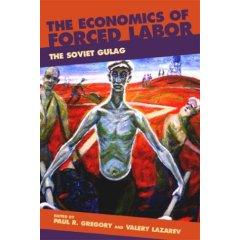| 2020ok Directory of FREE Online Books and FREE eBooks |
Free eBooks > History > Russia > The Economics Of Forced Labor: The Soviet Gulag
The Economics Of Forced Labor: The Soviet Gulagby Paul R. Gregory And V. V. Lazarev  Download Book (Respecting the intellectual property of others is utmost important to us, we make every effort to make sure we only link to legitimate sites, such as those sites owned by authors and publishers. If you have any questions about these links, please contact us.) link 1 About Book Book Description Until now, there has been little scholarly analysis of the Soviet Gulag as an economic, social, and political institution, primarily owing to a lack of data. This collection presents the results of years of research by Western and Russian scholars. The authors provide both broad overviews and specific case studies as they examine
From the Publisher Much has been written about the Gulag as an institution of penal slavery inflicted upon millions and as the ultimate symbol of Soviet terror. Until now, however, there has been little scholarly analysis of the Soviet Gulag as an economic, social, and political institution, primarily due to lack of data. This collection, providing both broad overviews and specific case studies, presents the results of years of research by Western and Russian scholars. These expert contributors examine whether the Gulag was created to serve the economic interests of the totalitarian state or was simply a by-product of the dictator’s consolidation of power. The authors examine the various forms of coercion and the channels through which coerced labor was distributed from the late 1930s to Stalin’s death in 1953, and reveal why the Gulag emerged and its perceived economic rationale. They detail the chronology of the Gulag from the first major projects—such as the White Sea–Baltic Canal and the Norilsk metallurgy complex—to later, unfinished plans. The book reveals how Soviet leadership sought to find the right balance between coercion and material incentives for the labor force—and how material incentives played an increasingly greater role in later years. We also learn of the day-to-day costs of maintaining the Gulag and the great hidden cost of coercion—lost productivity and rising criminality. Seen together, these contributions present an extraordinary portrait of a major aspect of the Soviet approach to economic achievement—their results should provide an invaluable lesson to future generations. Paul R. Gregory is Cullen Distinguished Professor of Economics at the University of Houston, a fellow at the Hoover Institution, and a research professor at the German Institute for Economic Research, Berlin. Valery Lazarev is a fellow of the Hoover Institution and is serving as a visiting assistant professor of economics at Yale University. Contributors: Leonid Borodkin, Robert Conquest, Simon Ertz, Paul Gregory, Christopher Joyce, Oleg Khlevnyuk, Valery Lazarev, Mikhail Morukov, David Nordlander, Andrei Sokolov, Aleksei Tikhonov Related Free eBooks
| Related Tags |












SEND A COMMENT
PLEASE READ: All comments must be approved before appearing in the thread; time and space constraints prevent all comments from appearing. We will only approve comments that are directly related to the article, use appropriate language and are not attacking the comments of others.